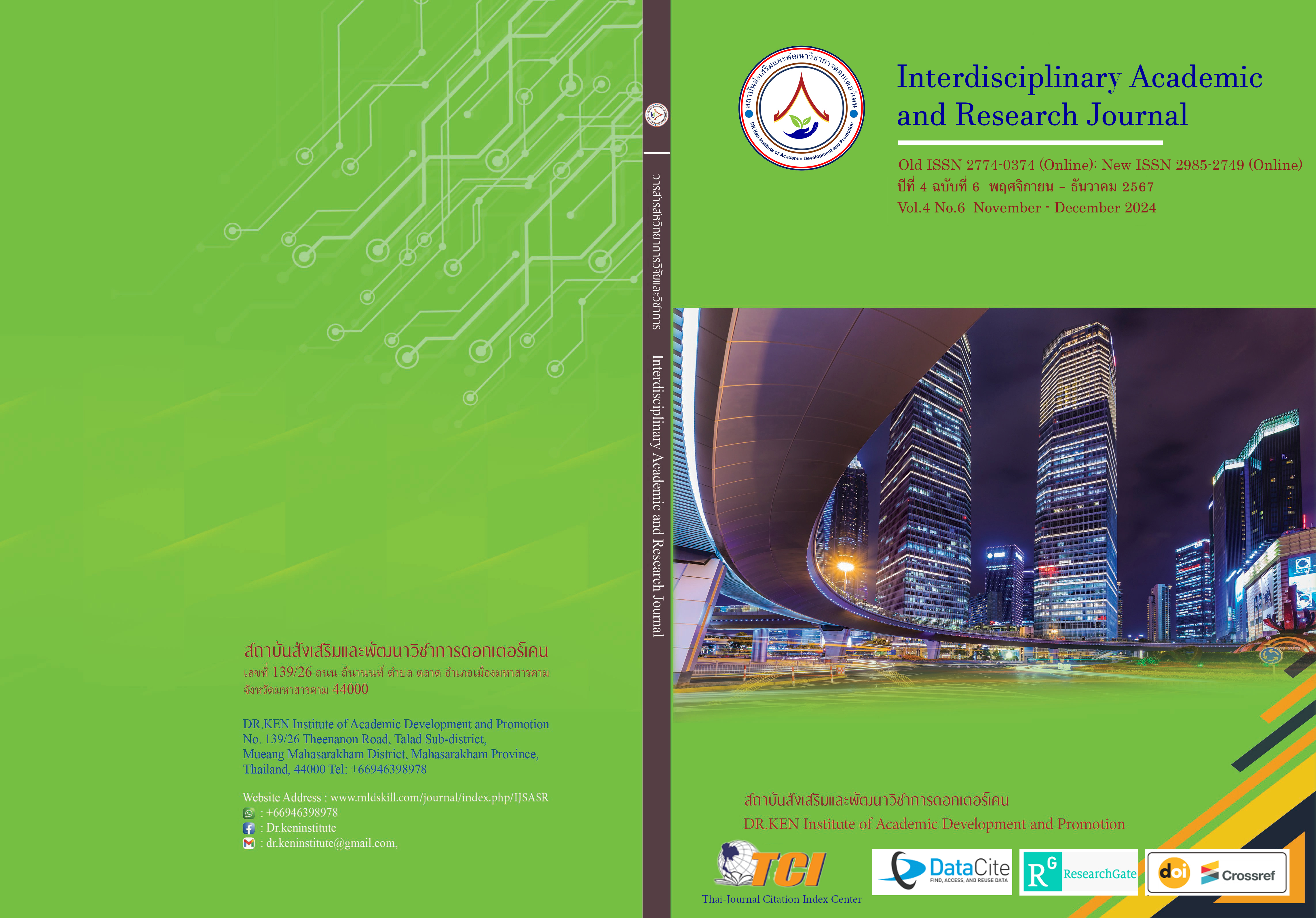Guidelines for Sustainable Community-based Tourism Development in Uthai Thani Province
DOI:
https://doi.org/10.60027/iarj.2024.279249Keywords:
Travel, Development, Sustainability, Community, ManagementAbstract
Background and Aims: Community tourism is alternative tourism managed by communities. So that the benefits of tourism can be passed on to people in the community. Community-based tourism is a balance between conservation and development for sustainable development. The general principles of sustainable development are conservation and appropriate use of resources to create long-term benefits and distribution of benefits to the community. Tourism is a tool for improving the quality of life, livelihood, well-being, Identity and culture and the environment in the local community To allow the community to participate in development Therefore, in order to achieve a balance between conservation and development, the concept of sustainable tourism development was born. The study therefore gives importance to community tourism with the objectives: 1. To study the context and tourist attractions according to the way of life in Mueang District, Uthai Thani Province. and 2. To study guidelines for community tourism development in Mueang District, Uthai Thani Province.
Methodology: Qualitative Research uses questionnaires as a tool for in-depth interviews in the question community tourism management community resources Culture, tradition, participation. Information providers are community leaders, government agencies. Private sector in the area Locals and tourists, a total of 50 people.
Results: 1. Studying the context of communities and tourist attractions according to way of life, it was found that in terms of natural resources It has a rich natural and unique culture. Cultural traditions There is a Thai-Chinese culture that has been passed down for a long time. Management There is a mutual agreement between the group and those involved. Participation There is cooperation between the government, private sector and the public to promote and support each other. 2. Guidelines for tourism development: It was found that there are 5 approaches to developing as a tourist destination according to the objectives of tourists.
Conclusion: Uthai Thani Province There are outstanding tourism resources. It has a unique cultural tradition. Tourism management involves the government, private sector and citizens jointly managing, promoting and supporting sustainable tourism. Guidelines for community tourism development in Mueang District, Uthai Thani Province are defined in 4 guidelines: 1) Develop it as a historical tourist attraction. 2) Develop it as an agricultural or natural tourism destination. 3) Develop it as a tourist attraction, a 1-2 night program or a morning and evening return trip. 4) Develop it as a local style tourist attraction. 5) Develop it as a special interest type of tourism.
References
กรมส่งเสริมการเกษตร. (2565). แผนยุทธศาสตร์ส่งเสริมการเกษตร ระยะ 20 ปี (พ.ศ. 2560 - 2579). กรุงเทพฯ: กรมส่งเสริมการเกษตร.
ณัฏฐพัชร มณีโรจน์. (2560). การจัดการการท่องเที่ยวโดยชุมชน. วารสารการท่องเที่ยวไทยนานาชาติ. 13(2), 25-46.
ทัศน์ชัย ศิริวรรณ. (2564). การพัฒนาดัชนีชี้วัดความสำเร็จอย่างยั่งยืนของกลุ่มวิสาหกิจชุมชนน้ำเกี๋ยน. อำเภอภูเพียง จังหวัดน่าน. วิทยาศาสตรมหาบัณฑิต สาขาวิชาพัฒนาทรัพยากรและส่งเสริมการเกษตร มหาวิทยาลัยแม่โจ้.
บุรณิน รัตนสมบัติ. (2557). การพัฒนาตัวแบบเชิงกลยุทธ์การจัดการธุรกิจอย่างยั่งยืนในอนาคตของวิสาหกิจขนาดใหญ่. มหาวิทยาลัยศิลปากร.
วารัชต์ มัธยมบุรุษ. (2562). โครงสร้างของระบบการท่องเที่ยว. วารสารการบริการและการท่องเที่ยวไทย, 14(1), 94 – 102.
แวคอดีเย๊าะ มะรอแม (2560).การจัดการการท่องเที่ยวเชิงนิเวศสู่การพัฒนาที่ยั ่งยืนของ จังหวัดปัตตานีภายใต้กรอบความร่วมมืออาเซียน. วิทยานิพนธ์วิทยาศาสตรมหาบัณทิต (การจัดการสิ่งแวดล้อม) คณะบริหารการพัฒนาสิ่งแวดล้อม สถาบันบัณฑิตพัฒนบริหารศาสตร์
ศรัณย์ สัธนานันต์ และคณะ. (2566). การบริหารจัดการการท่องเที่ยวให้มีความยั่งยืน. วารสารมณีเชษฐาราม วัดจอมมณี, 4(6), 232-245.
ศิรินันทน์ พงษ์นิรันดร และคณะ. 2559. แนวทางในการพัฒนาศักยภาพการจัดการท่องเที่ยว อำเภอวังน้ำเขียว จังหวัดนครราชสีมา. วารสารวิทยาลัยบัณฑิตศึกษาการจัดการ. 9(1), 234-259.
สำนักงานจังหวัดอุทัยธานี. (2566). แผนพัฒนาจังหวัดอุทัยธานี พ.ศ. 2566 – 2570. กลุ่มงานยุทธศาสตร์และข้อมูลเพื่อการพัฒนาจังหวัด, อุทัยธานี.
แสงรวี เกตุสุวรรณ. (2563). องค์ประกอบของแหล่งท่องเที่ยวที่ส่งผลต่อพฤติกรรมการท่องเที่ยวเชิงวัฒนธรรม ในประเทศไทยของนักท่องเที่ยวชาวยุโรป. คณะบริหารธุรกิจเพื่อสังคม มหาวิทยาลัยศรีนครินทรวิโรฒ.
อทิยาภรณ์ แก่นสุข. (2559). หลักการและแนวทางการบริหารการท่องเที่ยว. กรุงเทพฯ : สุขุมวิทการพิมพ์.
อัจฉริยาพร คันธมาลาเจริญ. (2564). การพัฒนาศักยภาพการท่องเที่ยวในแนวทางการท่องเที่ยว 4.0 กรณีศึกษาพื้นที่ตำบลกี้ดช้าง อำเภอแม่แตง จังหวัดเชียงใหม่. สาขาวิชาการวางผังเมืองและสภาพแวดล้อม มหาวิทยาลัยแม่โจ้
Barbier, E.B. (1987). The Concept of Sustainable Economic Development. Environmental Conservation. 14(2), 101 – 110
Brundtland, H. (1987). Our Common Future. New York: Oxford University Press.
Collier, A. & Harraway, S. (1997). Principles of Tourism. Auckland: Longman.
Ester, R.J. (1993). Toward sustainable development: From theory to praxis. Social Development Issues. 15 (3), 1 – 29.
Pelasol, J. (2012). Igcabugao: A Potential Tourist Destination in the Southern Part of Iloilo, Philippines. International Peer Reviewed Journal JPAIR Multidisciplinary Research is being certified for QMS ISO 9001:2008 by the Anglo-Japanese American Registrars of the United Kingdom.
Downloads
Published
How to Cite
Issue
Section
License
Copyright (c) 2024 Interdisciplinary Academic and Research Journal

This work is licensed under a Creative Commons Attribution-NonCommercial-NoDerivatives 4.0 International License.
Copyright on any article in the Interdisciplinary Academic and Research Journal is retained by the author(s) under the under the Creative Commons Attribution-NonCommercial-NoDerivatives 4.0 International License. Permission to use text, content, images, etc. of publication. Any user to read, download, copy, distribute, print, search, or link to the full texts of articles, crawl them for indexing, pass them as data to software, or use them for any other lawful purpose. But do not use it for commercial use or with the intent to benefit any business.
















.png)


